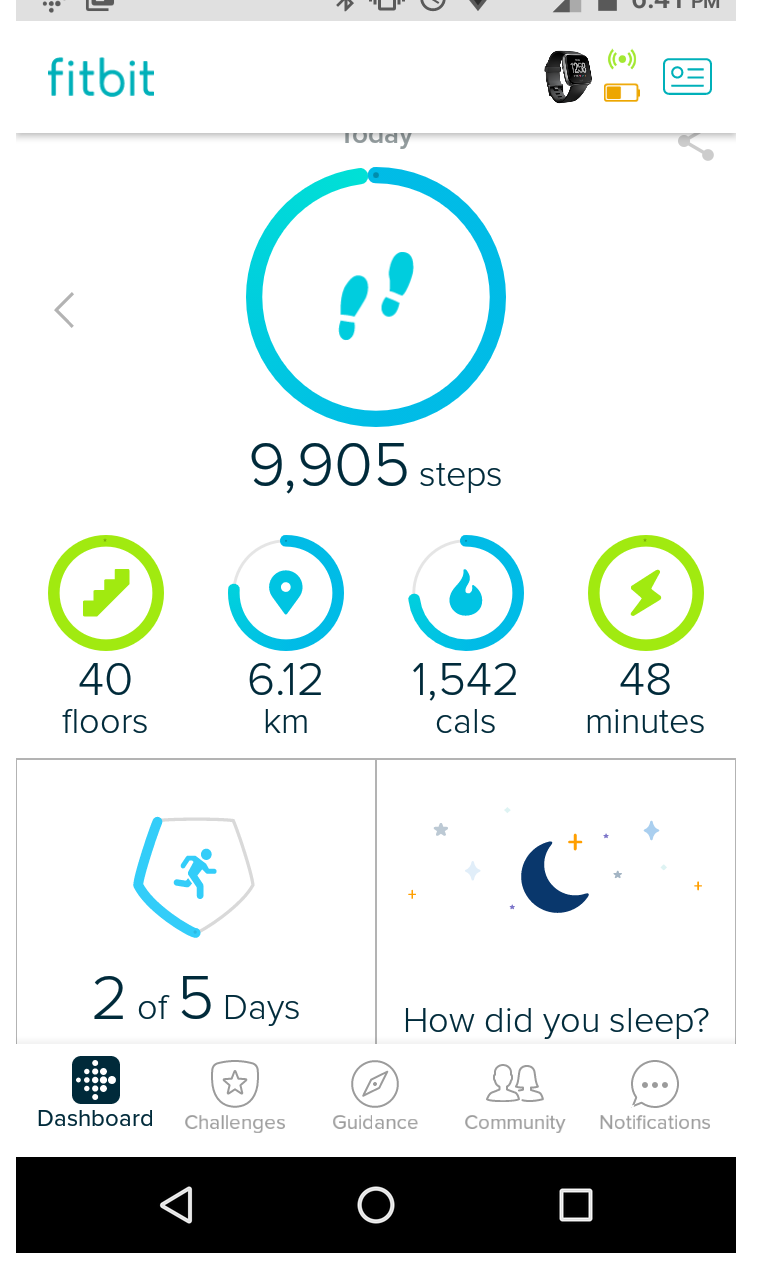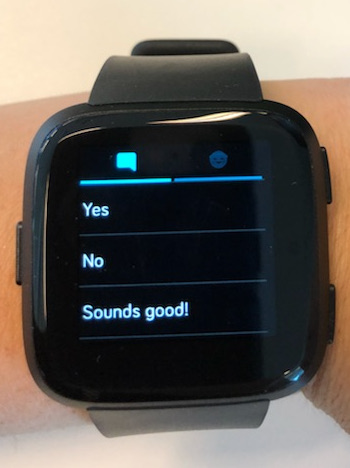--- the subscriber area has no ads and those above are not selected or endorsed by this site ---
Versa and the Race Against Time ?4
20:29 28-May-18
Executive Summary: the Versa is likely to sell far more
units than the Ionic due to its low price point and improved
feature set. The device shows Fitbit's experience at making cheap
products, which is both positive and negative, but also belies the
continued immaturity of its software ecosystem. Even though the
Versa does improve the company's prospects significantly, I expect
the good fortune to only last until a new wave of competition hits
towards the end of the year.
Evaluation Parameters
The Versa was given to an active female professional for evaluation on May 4th. It's taken us quite a while get an assessment of the Versa out, and the reasons why are significant. Quick Replies and female health tracking features were announced as available just three days later. Despite this, the new functionality was not available on our model until May 14th. This is because Fitbit actually rolled the features out only very gradually in order to test them. Processes like this have become common, even with end-user devices, but as a programmer, I find them to be sad commentary on the state of both software development and consumer relations these days.
While we waited for the features we most wanted to test, the user quickly came up with the following list of Pros and Cons about the Versa's basic functionality:
Pros:
- Top-notch smart-phone interface to data: Fitbit has been consistently lauded in this area, and our tester added her kudos, particularly appreciating:
 the dashboard of activity for the
day (see image to the right) including calories burned, not
just steps taken.
the dashboard of activity for the
day (see image to the right) including calories burned, not
just steps taken.
- the breakdown by hour of when she is active and how far she has traveled.
- automatic sleep tracking which appears accurate at least on
overall time, though it is more difficult to verify the REM,
Light, and Deep sleep figures.
- Improved activity tracking on the device: the Versa's activity tracking appears superior to prior generation devices. Our tester had previously owned a Sony Talkband, which routinely failed to measure some activities correctly. The Versa also appropriate differentiates between stairs and steps. That said, note that actual performance is also in the list of Cons, below.
- Battery Life: I can't stress this one enough. Like the
Ionic, the Versa allows you to go multiple days without
recharging, even when active. In this regard, it clearly bests
all competitors but Garmin which, as I've noted before, is on
par because it and Fitbit are the only entrants to roll their
own hardware rather than relying on outdated Qualcomm SoCs.
More on this below.
- Water resistance, so she doesn't have to take it off in
the shower, was appreciated.

- Aesthetics: the screen is bright and easy to read; some
have dinged it for large bezels, but this did not trouble our
tester. More importantly, the Versa is sleeker and lighter than
competitors, which is key for many female wrists!
- Connection reliability: there was a great deal of
difficulty reconnecting the Versa with her Moto E4 after loss of
connection.
- Support: initial attempts to troubleshoot this issue
got a rather bland response from Fitbit, asking us to try the
watch with other phones, and questioning compatibility. They
seemed to miss the point that the watch does connect, just not
reliably. To be fair, the phone is probably at least as much at
fault as the Versa. Our test user was able to pair reliably
with her iPhone, though the Versa will not use more than one
phone simultaneously. I've also touched base with other
multiple other Ionic users and they have not had problems
reconnecting. Nonetheless, the problems we experienced are the
sort of thing that software development teams work through all
time, and something that usually improves as the software
matures. It's no surprise that it has a long way to go, but on
the support side, if we were to espouse the stance initially
offered by Fitbit, then the company should be advertising the
Versa as only compatible with two
dozen Android phones, which we only got a list of after
more cajoling.
- Lack of features: The connection issues quickly brought to the fore that there is no alert when the Versa disconnects from the phone. Similarly, when the two are connected a Find My Phone feature is something that is available elsewhere and much requested by users, but so far pleas have been roundly ignored by Fitbit developers. Things like this speak to the poor third-party software ecosystem problem that I have highlighted from the beginning.
- Weak Notifications: our test tends to miss messaging
notifications when she is on the move because buzzer is simply
too weak. Other have reported this too, and it's shocking
(though not literally)
to me that Fitbit wouldn't code in some basic optionality into
such an important feature. The prior link is one potential
explanation; being forced into cheap device construction is
another.
- Motion Sensitivity and Lag: the Versa was not
sensitive enough to wrist motion to always give the time,
particularly when a discreet check was desired. Even when it
does register the wrist turn, there is a pause before it shows
me the time. For discreet checks, this means it's not seamless,
and even in other situations the delay quickly becomes a
significant annoyance.
- Activity Tracking Accuracy: although there has been
improvement, this is still far from perfect. For example, the
app registered 26 minutes of outdoor biking, but our tester
never bikes! Similarly, yoga classes were a total loss as far
as tracking was concerned.
Competitive Assessment
This last point raises what I suspect is a crucially misunderstood
point about the recent collaboration with Google. Alphabet has literally
left any trace of its original "Don't be evil" motto behind. Most
consumers have become inured to the privacy concerns that should
go along with their personal data being stored on anywhere other
than on their own private devices. So the marketing impact of
this new agreement should be minimal or even slightly positive.
What I'm concerned with is the competitive trade off. Fitbit gets
a more reliable and capable cloud than the one that failed
it just before the agreement was announced. What does Google
get? It gets information it can use to further its own health
care initiatives, which is all well and good on the big data side
where Fitbit was never realistically going to out-compete the
behemoths anyway. However, on the data collection edges, where
Fitbit makes its (meager, as of late) living, I posit that Google
gets exactly the usage data it needs to fine tune its own wearable
devices and the software that runs them. My position is supported
by Fitbit's
Terms of
ServiceBy making Your Content available on or through the Fitbit Service you hereby grant to Fitbit a non-exclusive, transferable, sublicensable, worldwide, royalty-free license to use, copy, modify, publicly display, publicly perform, reproduce, translate, create derivative works from, and distribute Your Content, in whole or in part, including your name and likeness, in any media.and its Privacy Policy
We transfer information to our corporate affiliates, service providers, and other partners who process it for usThese partners provide us with services globally, including for customer support, information technology, payments, sales, marketing, data analysis, research, and surveys. These partners provide us with services globally, including for customer support, information technology, payments, sales, marketing, data analysis, research, and surveys.I'm not claiming that Google is going to be spying on whether or not you slacked off last Thursday, though anyone who doubts the possibility of even that level of invasive analytics should revisit Facebook's history with Cambridge Analytica. The real danger here is that Google is able to make aggregate observations for fine tuning Wear OS, and showing what anyone who's really analyzed this space already knows: that the current generation of products are great motivational tools, but poor diagnostic devices.
As I covered in conjunction with the 4Q17 report, Fitbit and Garmin have enjoyed temporary shelter from from Android competition because of stagnant hardware. However, that is about to change with the introduction of a new SoC (system on chip) from Qualcomm this fall, which will probably debut with a Google branded wearable this fall. It will be followed by host of new holiday season competitors with vastly improved battery life, due to modern foundry production. Expect that to be accompanied by plenty of technically independent media reports pointing out the flaws in current health data collection. However, I expect the deadliest point of comparison will be something I've harped on for a long time...
Messaging
If you've been following my thoughts on wearables, you know that I think messaging is the other key feature (along with health tracking). Though some have wanted more, we found Quick Replies easy to use and reliable, assuming you become aware of the notification at all. However, Fitbit has not included any ability to dictate a response, likely because its software is not up to the task. Alphabet's clearly is, and I expect this functionality to really come to the fore in the next iteration of devices based on the hardware and software mentioned above. When it does, I think Fitbit is going to have major problems competing. Our test user supports this, sayingI like receiving texts, when it happens to be connected to my phone. Quick-replies are a nice to have, but honestly, I have not had too many scenarios when I use them because the conversation needs more than a canned response a lot of the time.I already dictate messages most of the time on my phones. I just don't see any way that Fitbit (or Garmin, for that matter) can match Google when it comes to voice recognition. Arguably, the Flyer headphones, which have a microphone, can simply interface to Android to make use of that functionality, as could a future watch with a microphone. Nonetheless, I think Fitbit's integration will lag that of native Android and iOS devices.
 CrowdWisers™
CrowdWisers™